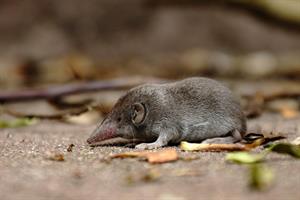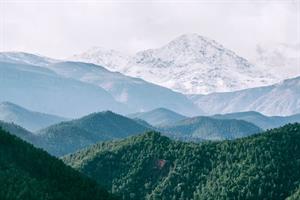PDF chapter test TRY NOW
August 31
It is the last day of August, and the lush monsoon growth has reached its peak. The seeds of the cobra lily are turning red, signifying that the rains are coming to an end.
In a few days the ferns will start turning yellow, but right now they are still firm, green and upright. Ground orchids, mauve lady’s slipper and the white butterfly orchids put on a fashion display on the grassy slopes of Landour. Wild dahlias, red, yellow and magenta, rear their heads from the rocky crevices where they have taken hold.
Snakes and rodents, flooded out of their holes and burrows, take shelter in roofs, attics and godowns. A shrew, weak of eyesight, blunders about the rooms, much to the amusement of the children.
“Don’t kill it,” admonishes their grandmother. “Chuchundars are lucky — they bring money!”
And sure enough, I receive a cheque in the mail. Not a very large one, but welcome all the same.
In a few days the ferns will start turning yellow, but right now they are still firm, green and upright. Ground orchids, mauve lady’s slipper and the white butterfly orchids put on a fashion display on the grassy slopes of Landour. Wild dahlias, red, yellow and magenta, rear their heads from the rocky crevices where they have taken hold.
Snakes and rodents, flooded out of their holes and burrows, take shelter in roofs, attics and godowns. A shrew, weak of eyesight, blunders about the rooms, much to the amusement of the children.
“Don’t kill it,” admonishes their grandmother. “Chuchundars are lucky — they bring money!”
And sure enough, I receive a cheque in the mail. Not a very large one, but welcome all the same.
October 3
We have gone straight from monsoon into winter rain. Snow at higher altitudes.
After an evening hailstorm, the sky and hills are suffused with a beautiful golden light.
After an evening hailstorm, the sky and hills are suffused with a beautiful golden light.
Explanation:
The diary entry on \(31\)st August declares the end of the monsoon. An abundance of flowers and lush green growth fill the hills. The colour was changing from the seeds of the cobra lily to red, hinting the end of the rainy season.
As the next few days, the flowerless plants would begin to turn yellow against their present fresh green colour as they stand firm and upright. The author mentions how the ground orchids, white butterfly orchids and the mauve lady’s slipper made the grassy slopes of Landour look fashionable.

Ground orchids
Furthermore, the wild dahlias, red, yellow and magenta, turned their heads back towards the narrow openings in the rocks where they had taken hold.
The snakes and rodents came out of their holes and burrows in huge numbers. They took shelter in roofs, attics and godowns. A small insectivorous mammal resembling a mouse, namely a shrew, with quite weak eyesight moved about clumsily in the room. The children were amused by the shrew which blindly bolted around the room. Their grandmother calls the shrew as Chuchundar and warns them against killing it. She says the Chuchundars, as shrews are called in Hindi, are known to bring good luck, money and prosperity.

Shrew
The author, too, mischievously wonders if the shrew has something to do with the cheque he receives in the mail. Although not a huge amount, he welcomes it anyway.
The month of October took the mountains straight into winter rain as it marked the end of the extended monsoon season. The higher altitudes were covered with snow.

Snow on hills
On the \(3\)rd day of October, the sky and hills were bathed in beautiful golden light after experiencing a hailstorm the evening before.
Meanings of difficult words from the paragraphs:
No | Words | Meanings |
1 | suffused | gradually spread through |
2 | Landour | a small cantonment town contiguous with Mussoorie |
3 | orchid | a plant with complex flowers that are often showy or bizarrely shaped |
4 | crevice | a narrow opening resulting from a split or crack |
Reference:
National Council of Educational Research and Training (2006). Honeydew. A Short Monsoon Diary (pp. 109-117). Published at the Publication Division by the Secretary, National Council of Educational Research and Training, Sri Aurobindo Marg, New Delhi.
